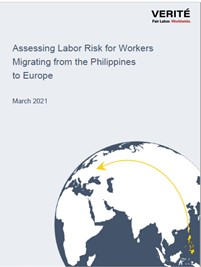Millions of people from the Philippines have migrated abroad for employment, seeking a better life and improved economic status for themselves and their families. Today, over 10 million Filipinos are estimated to live and work internationally, with 368,000 Filipino citizens in Europe alone, making the Philippines a key source of labor in Europe. Many Filipino workers benefit economically and have positive experiences from migration. For others, the process of gaining employment in Europe from the Philippines can be fraught with risks; some Filipino workers may find themselves working under exploitative conditions or under the weight of debt from fees paid during the recruitment and migration process. In some cases, these risks may constitute forced labor or human trafficking. Recruitment mechanisms for migrant workers from the Philippines to European countries are heterogeneous, as they vary based on the demographics of each worker, the specific laws of the host country, the practices of the employer and labor recruiters, and prevailing conditions in specific sectors. In spite of this diversity of experiences, unethical and opaque recruitment practices are a common thread throughout stories of exploitation and forced labor risk, regardless of sector or the destination country in Europe.
In 2020, Porticus engaged Verité to provide an assessment of labor risks for Filipino migrant workers in several target sectors and host countries in Europe, with a specific emphasis on risks that arise from the recruitment and hiring process; as well as risks during employment or while being deployed in Europe. The following study is intended to provide relevant stakeholders with insight into how these risks play out in practice and what underlying systemic factors and policies contribute to risk. The report contains examples of strategies and interventions for concerned stakeholders to address these issues.

